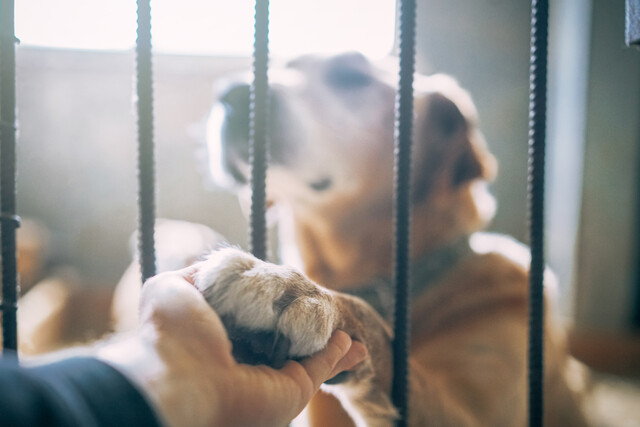Before placing a dog into a center, most pet owners ask questions, just as a pet center will need information about the customer and his dog. Pet owners worry about the supervision of the dogs. They wonder if the attendants will actually play with the dogs, intervene if the dogs become aggressive, and how the dog day care attendant will communicate to the animals.
They must know that employees are trained in the care and safety of dogs, understand the dog behaviors and can teach the dog the commands they use at the center. When they see your isolation room will they see that it has a run to the outside for elimination and exercise purposes? You need to explain when and for how long it might be used. Dog owners worry about the ratio of attendant to dogs and having a secure fence. They don't want their dog to be at risk of getting out and most have a preference for a yard as opposed to being leashed.
Dog parents want to know what happens in their dog's day. Will you provide a schedule and a written or e-mail report at the end of the day? Make sure the customers know your emergency plan procedures and understand the information you need. Make sure you know how to contact their personal vet for emergencies. Doggy parents will be watching your staff to see if they really care and enjoy the dogs. It is important that their pets feel loved and safe during the day. It is important to the owners that the staff know about their dog specifically, that they know and employ proven methods for making a new pet have a positive experience. They also want to know that the staff interact with all dogs throughout the day.
Dog parents, your customers, should not have to ask any of these questions. Your center, to be successful, must have information available to all pet owners both on line and in written form.
Dog parents want their pets treated more humanly than ever before. They seem to require day care centers to offer grooming, vet access, training and more. Just like parents of children, doggy parents want more conveniences due to their busy lives. Providing video chats with their dogs while they are out of town and the dog is boarding, offering on line scheduling, and services during the dogs stay that will save owners time, are all conveniences and special treatment many are willing to pay for.
It will be important for a dog day care owner to be aware of the services customers want in their locality. This kind of work should have been done in your initial research before beginning the planning of your dog day care. You have to offer what the customer demands to stay in business. Sometimes your customer is unaware of the possibilities and you have to market new services and products well.
Make sure you know the dogs that are signed up for care. Dogs who don't socialize well because they have been abused in the past, because they are just older and want to be left alone, or because they are timid or anxious around other dogs are often thrown into a day care to alleviate the dog of their fear or anxiety. This doesn't work well at all. Just like parents of dogs who are overly aggressive, or those who bully might think putting them into dog day care will make them less aggressive are making a mistake. Dogs that do not mix well with other dogs require special treatment or training. That is why interviews with both the dog and their owners are necessary.
Prevention of, and Avoidance of Problems with Dog Parents: Communication is the key. You cannot communicate too much or in too many various forms. Using your website, pamphlets, booklets, newsletters both on line and in print, phone calls, one on one discussions and visuals in the center, like announcement boards are all important. You want to fill the need for different communication modes for your individual parents. Your customers need to be made aware of pet organizations, local pet clubs, events and training that is available to them. Your center needs to be involved in these things as well. You want people to love their dogs, and keep them healthy for your business to be profitable.
Giving frequent notices to remind dog parents about hazards dogs face, emotional needs of pets, details about specific breeds, adoption opportunities and options for low cost medical care for their dogs is a service that will earn your center a good reputation. One of the greatest offerings a dog day care can provide is free time for dog owners to meet. Just like children in a class together, dog parents like to get to know the other parents of their dog's class. Offering some free training, new dog parent classes, and workshops on various dog interests will bring new clients into your facility on a regular basis and support those you have. Being an excellent day care for dogs and offering community events like dog walks, or runs, or to collect money or supplies for a local humane center, all demonstrate that your facility is more than just a mere kenneling of dogs.
If you are proactive and develop good communication with your customers, then when you have to discuss a delicate subject with them, it will be easier. If you develop a trusting relationship and show respect for your clients, you will be in a better place to approach them about viruses that you've discovered another dog brought into your day care center. Encourage dog owners who seem to be unaware of dog knowledge to attend a pet care training session even giving them a free ticket. It can help you keep the dog parents aware and knowing how to work with you to maintain healthy dogs.
The more you educate your dog parents with pamphlets, newsletters, posters, website information, and free classes, the less energy and time it will cost you to repair issues. Keeping your staff well trained in knowledge and communication techniques and customer relationships will also increase not only the satisfaction with the parents but with the employees who work with you. Make sure you keep parents aware of how to find quick and easy testing for dog health problems. By becoming proactive in the education, relationships, and communication with clients you are protecting them, their dogs, you, your staff and your success as a dog day care owner.
Meet The Parents: Initially when a client approaches you or your center about dog day care, or when they call in or e-mail, they will usually ask one question. What they really want is to initiate a conversation that will give them information about you, the center and what to expect. They may want to know about how you manage the dogs, your philosophy on bad behaviors, what activities will be provided, quiet areas for their dogs and your schedule of feeding and medication giving. They will have questions they haven't even thought of yet, unless they are an experienced day care parent looking for a new day care.
Be ready to answer questions. New dog parents want to know that you have already shown concern for what they bring up. They want you to know a lot about dogs and dog issues. They need you to be informed, confident, and caring. New dog parents should never be asked to sign up for your services until they have visited the center during the same hours as they want for their dog, have had an interview with you, and until you have evaluated their dog for health and aggressive tendencies.
New dog parents need you to be honest with them. Give them the truth from the beginning about what you see as proper care for their dog, what to expect from your center and what it will cost. There are always those owners who do not want to or cannot afford to pay for good dog care. You cannot give people cut rate prices or low level care to meet their financial problems. What you can do is go to a fund raising site on line and try to help them raise money for their dog day care funds. Your center can offer to help them find the funds. You might do this proactively and maintain a group of people willing to offer scholarships. Never risk your business by taking dogs without charging the owners because your good business cost money. If you don't run your business well, all your customers will suffer.
Dog FAQS: Canine Influenza is a flu that is spread through dog fluids, coughing, sneezing, nose to nose sniffing, and toys. When there is an outbreak, dogs should not be taken where there is exposure to other dogs like dog parks, kennels, groomers, dog hotels and day cares.
After exposure, your dog may not show any symptoms for up to ten days. Discharge, lethargy, loss of appetite, and cough or sneezing may signal the virus. This dog flu, also known as canine influenza H3N8, was first seen in dogs in 2004 when it swept across the united states in rampant waves. 5% of dogs contracting this virus died. In 2015, in Chicago, a new strain of influenza, formerly seen only in Asia was diagnosed. Influenza H3N2 is different from the viral strain H3N8.
The mild strain of H3N2 is similar to those of the H3N8. It is presented by nasal discharge, sneezing, cough, fatigue, and loss of appetite. Often a second bacterial infection can erupt as well. The dog may have these milder symptoms for up to 30 days. The more severe strain looks like pneumonia and is accompanied by a high fever. Recently a vaccination for the H3N2 became available. Vets, however, do not recommend the vaccine for dogs that are at lower exposure of the virus or those that are rarely kenneled or spend social time with other dogs.
Because both of these virus strains are new in to the United States, dogs have not build up natural immunities and those dogs whose life style exposes them on a regular basis to other dogs, are at risk.
Today there is a flu shot your dog can get to avoid this particular strain. Dog friendly humans who find themselves hugging and petting dogs other than their own should wash well and possibly change clothes before snuggling with their own pet, if that other dog had symptoms or if the flu is going around.
Summary: Dog parents are your bread and butter. They are where your reputation rests. Their assessment of what you do, how you do it, and why you do it will make or break your business. For success in this business, you have to be proactive, preventative and prepared. Your dog day care has to be ready to serve the community in many ways. Your knowledge and the education level of your staff will be drawn upon. How you care for the dogs in your care and the communication and actions of you and your staff are on display. Using technology to be transparent, being open for dog owners or possible dog owners to tour and visit at any time must be made available. The training you give your employees, the cleanliness of your facility, the safety of your spaces and the focus on healthy dogs will be your marquee. It will speak louder than any marketing you entertain.
You can look at your dog day care in two ways. It is a business and it is a dog friendly place for dog lovers to collect. You cannot separate one from the other. You cannot say it is a business first. There are businesses that do not have to adhere to the care, health or safety of others or animals. They merely corral items into a location and people buy them. A dog day care is different. A dog day care business sells love, care, and safety. You are being paid to attend to the dogs, play with them, take care of them and keep them safe and healthy. What is the price for that? Think about what a responsibility you will have and think of the amount of trust your clients have to have in you.
On top of all that you will be expected to know about dogs, be able to educate the client and to train the dogs. You have to know about good health care, safe trends and stay in touch with what your parents want and expect. It is a job that one needs to think about, research, train, educate and plan for. It is a job that can be rewarding both intrinsically and financially. It is a job that requires the skill and the ability to communicate well. It is not an easy job. Don't take the responsibility lightly. If you do it, do it with your eyes open and your emotions in control.

























